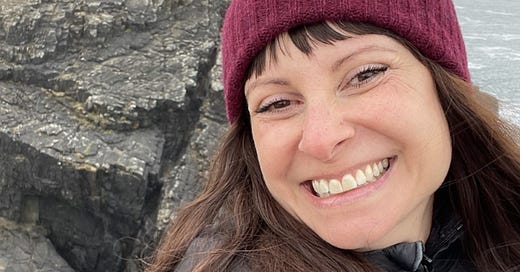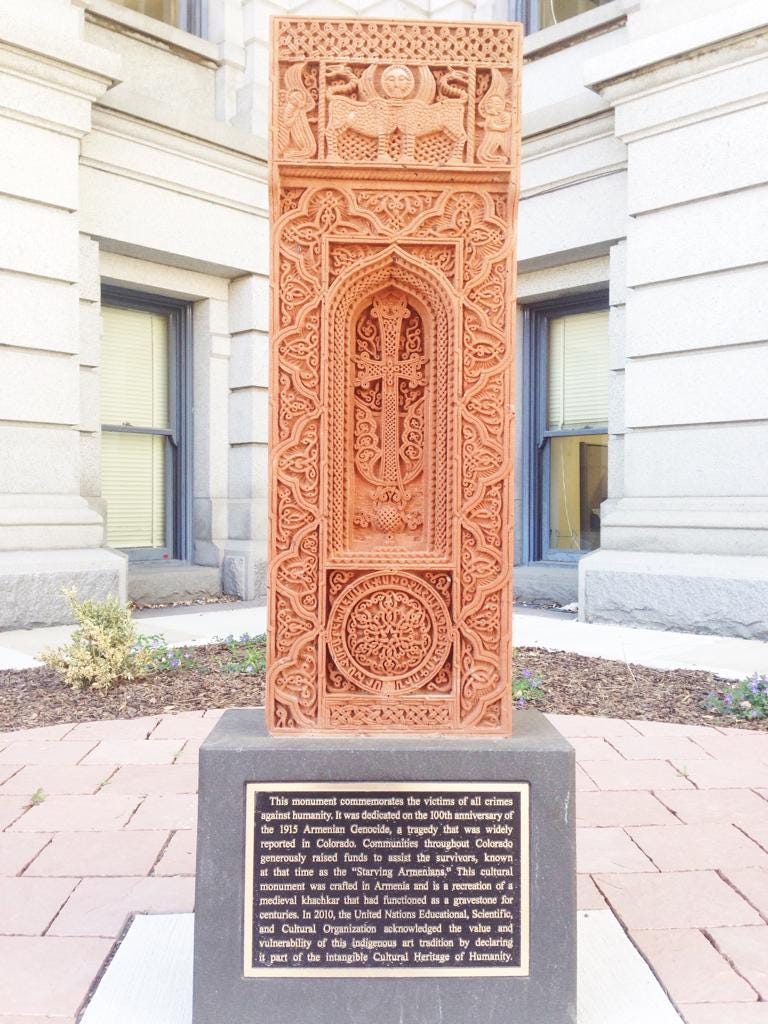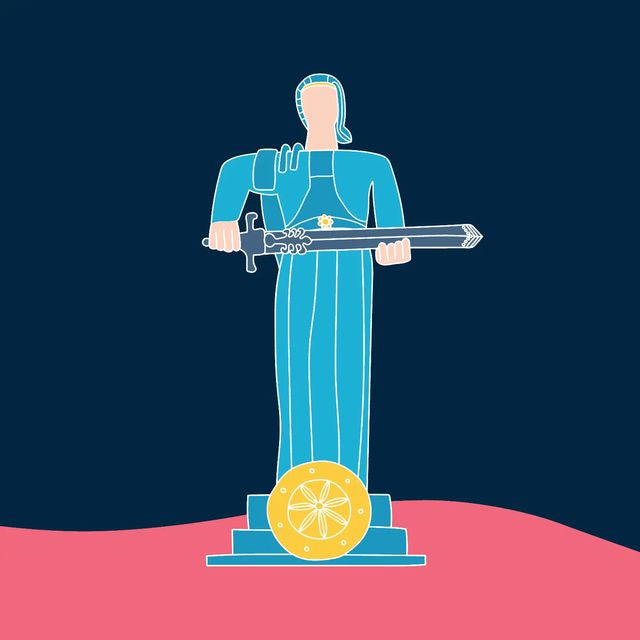'A unique trauma accompanies being Armenian because the genocide is still denied by most of the world'
Stephanie Shakay Tierney on the Scottish witch trials, the Armenian Genocide, and the importance of remembering the past
Hello and welcome back!
This week I’m spotlighting the wonderful anthropologist Stephanie Shakay Tierney in a conversation on the Scottish witch trials, the Armenian Genocide, and the importance of remembering the past.
Stephanie has a background in Museum Studies and is currently a PhD candidate at the University of Edinburgh.
She was such a warm and considerate interviewee who talks frankly about being a white person with brown heritage, the way the Armenian Genocide continues to impact those living in the diaspora, and how grappling with her ancestors’ past has helped inform her academic work. I hope you love this talk as much as I did!
How do you describe your heritage?
In the UK I’ll give you a different answer than I might have done in the states because here my accent gives me away as American. So, my heritage is from America. But it’s not how I would describe myself when people ask. I always just say, I'm Armenian. Because of the Armenian Genocide, most other Armenians I meet in the diaspora — even if they’re a small percentage Armenian — will tell you they’re Armenian. Then I typically overshare and tell people my mom is from Beirut. My mom is an immigrant, a refugee actually, and that’s an important part of my heritage too. Then I’ll usually get a look because my last name isn’t Armenian. Armenian last names always end with ‘ian' but my last name is from my dad, who is American. But I don't really identify with being American, I feel Armenian. Growing up speaking the language, eating the food, and being made fun of in school for bringing the weird stuff to lunch; my heritage is wholeheartedly Armenian.
“Just because I'm mixed-Armenian, that doesn't negate the fact that I'm white.”
How do you understand yourself in terms of race?
My mom is categorically a brown person. I am not, I'm white, with all of the privileges that come along with that.
Is it your physical appearance that makes you feel that way?
Yeah, it is my physical appearance that makes me feel that way. In terms of geography, Armenia is part of the caucuses, so Armenians are a “Caucasian race”, even though the majority of Armenians and my own family might typically not be classified as white on a survey because their skin is not. It’s such a complicated question, but I am white. And part of the reason I don't challenge that is because of the white privilege that I carry. It's not appropriate for me to challenge that. Just because I'm mixed-Armenian, that doesn't negate the fact that I'm white.
What was your relationship like with your heritage growing up?
Growing up in Denver, Colorado, there was no organised, congregated Armenian community. When my mom’s family emigrated from Beirut, they went to New Jersey, where there’s a huge Armenian community. In places like New York and California, there are Armenian neighbourhoods, restaurants, shops, and churches (which Armenians tend to settle around). My mom’s entire family moved to Colorado in the 70s, so growing up I didn't know any other Armenians except for my cousins who lived in other states. I was baptised in a Greek Orthodox Church because Armenian priests visited and held Armenian mass sometimes. Later in life, going to the same Catholic school my dad went to, it became an issue when it was time for me to be confirmed; the church said I couldn’t get confirmed there because I wasn’t actually Catholic.
I didn’t look much different from my peers, but I went to this really small, private, Catholic school where you know everyone from the age of around eight. There was absolutely no diversity at that school, I think there was just one Black kid. So I was part of that diversity as someone who didn’t look different but was different. Everybody's bringing in their very American peanut butter and jelly and chips for lunch, I'm pulling out dolma or rolled grape leaves. And people made fun of me for speaking the language with my mom. I didn't speak English until I was three, I only spoke Western Armenian, and there was some concern about how was I going to fare at school.
“my relationship with my heritage is probably stronger than it ever has been. I'm 40, I'm single, I don't have kids and I probably won't have kids. Who am I going to pass this matrilineal lineage of my mother and my grandmother on to?”
How does that compare to your relationship with your heritage today?
This is an interesting time to be Armenian because there is an ongoing war in Artsakh between Armenia and Azerbaijan, and most people have absolutely no idea. The people of Artsakh have been without power since 12 December 2022 because The Lachin Corridor, the sole route connecting Artsakh and Armenia, has been under blockade by Azerbaijan. This isn’t to try to take attention away from other humanitarian crises that are going on. But this is a pattern with Armenians, people just don't know. And it's all very political because Turkey is an ally of “the Western world”, so I constantly feel like I'm yelling into an echo chamber.
There's a unique trauma that accompanies being Armenian because the genocide is still denied by the majority of the world. And there is a pretty outspoken online presence of Turkish people who have absolutely no problem expressing that they still think Armenians should be exterminated. So my relationship with my heritage is probably stronger than it ever has been. I'm 40, I'm single, I don't have kids and I probably won't have kids. Who am I going to pass this matrilineal lineage of my mother and my grandmother on to? It is going to end with me because I’m likely not going to have a biological child, so I’m really passionate about speaking out about Armenia (there's a little joke amongst Armenians, which is: how do you know somebody's Armenian? Don't worry, they'll tell you).
I’m trying to reconnect with the language as well, having grown up without anybody to speak with outside my family. Pretty standardly, as a cheeky, bratty teenager, I stopped speaking it at a young enough age that I forgot most of it. Though I can still understand and hold passable conversations with my mom and my grandma. I've been taking language courses — I have to plug the Centre for Western Armenian Studies. It's just been so phenomenal for me to be connecting with other Armenians in the diaspora. Then also the way I’ll dress and present myself with my jewellery is always to show I’m an Armenian person.
Tell me about your research
I study the people doing contemporary memory work around the Scottish witch trials, so that involves working with artists and authors, people hosting podcasts, groups of people doing memory work, and people who build memorials.
“Thousands of people in Scotland were executed in the early modern period as witches. But it's not a topic that's taught in schools.”
What draws you to memory work?
Everything, for me, comes back to being Armenian. I come from a heritage that is either completely unknown or forgotten. The Armenian Genocide started in 1915. Survivors, who were infants then, are over 100 now. The term genocide was coined to describe what happened to the Armenians. Before the invasion of Poland in 1939, Hitler made a speech outlining his plans to send Polish men, women and children to death in the name of gaining living space, saying "Who, after all, speaks today of the annihilation of the Armenians?" So it’s super important for me to remember. Because if I don’t, who will? If I don’t carry on some of the traditions of my family — and that's more than just the recipes we cook, although that's part of it, but also stories that are told — who will? Also, living in Scotland and studying museums, cultural heritage, women's history, and what's represented and what's left out has influenced me. Thousands of people in Scotland were executed in the early modern period as witches. But it's not a topic that's taught in schools. I've met Scottish people who don't know about this, but who will say they know all about Salem. Only 19 people were executed in Salem, it’s a drop in the bucket, comparatively.
What kinds of memory work around witches are people doing in Scotland?
I came across people who are really passionate about memorialising those who were accused. They are creating art and music — there are so many beautiful things being inspired by memory — and there's also a legal component to it all. There are groups who are advocating at the level of the government for a pardon. There's a campaign with a three-pronged approach: they want an apology, a pardon and a national memorial. On International Women’s Day in 2022, Nicola Sturgeon [Scotland’s first minister] made an apology.
Why should people care about the witch trials when they happened so long ago?
I wouldn’t like to speak for my interlocutors, but some of the things that people publicly state are that there are parts of the world where witchcraft is still very much a crime. It is seen in events of homophobia and transphobia and femicide, the ways in which marginalised groups are still discriminated against and persecuted, and murdered. Trans people are killed at an alarmingly disproportionate rate. And it's like the old saying of, ‘Those who don't remember history are doomed to repeat it.’ So it’s about remembering these crimes against humanity. A disparate minority group was disproportionately targeted, and it’s important to remember that in an attempt for it to not happen again. There aren’t going to be reparations because there’s not an area in Scotland that was untouched by this, and its unlikely reparations could be made to the entire country, but, for those doing this work, it is about recognising the complicated history and saying, ‘yeah, this happened, and it wasn’t right. We will admit it was wrong.’
Have your mixed geographies informed your work in any way?
I find that being an American in the UK, sometimes I don't even want to open my mouth because my accent just immediately identifies me! There's not a high opinion of Americans on the world stage, and rightly so. Part of the reason why I'm in the UK is that I voted with my feet. I wanted to leave a country whose politics I don't agree with. I thought about how I could contribute to the country that I want to establish as a home. So I thought adding something to the body of research around Scottish history would be a way for me to contribute to this country that has adopted me, rather than the other way around. I feel incredibly welcomed in Scotland. I do try to stay really curious and teachable. I don't know if that's just who I am by nature, probably a little bit, but also, I'm really aware that I am a Sassenach.
Outlander fans will get that one!
When I first read Outlander decades ago and came across that word, I thought it was similar to a word Armenians have called odar. Sassenach and odar are both these terms for ‘other’, but they're a bit derogatory. If someone says an Armenian married ‘an odar’ it's not exactly a compliment. But technically, I’m an odar, right? Because I’m not “full-blooded” Armenian. It’s not important to most people I come across, but I’m sure it’s important to some.
Is there someone from a SWANA diaspora you find inspiring right now?
This phenomenal artist, Maria der Mosessian. She doesn’t just share a piece of art she creates — which are stunning — but she also shares the story behind it, which has been vital in helping me learn more about Armenian mythology.
Also, Ali Cat, aka Entangled Roots Press — a printmaker and artist in Portland, Oregon. They've made a zine, called Operation Nemesis. Nemesis is the ancient Greek goddess of divine retribution and vengeance. She mercilessly avenges those who unduly acquire immense fortune at the expense of the poor. There was an operation conceived and carried out by survivors of the Armenian Genocide called Operation Nemesis, where they did exact their vengeance, and I'll leave it to folks to find out more about that. No spoilers.
What is something you have changed your mind about lately?
I've met wonderful Turkish people in the past, but then there have been other times I have been in situations where I haven't felt safe around Turkish people as an Armenian. So it’s really complicated. But I have changed my mind about the knee-jerk reactions I’ve made about Turkey in the past. Those reactions are in conflict with my values, but I would always make an exception, which was very flippant; I’d think, well, I'm Armenian, so I'm allowed to feel this way. But, no, I'm not. I'm absolutely not entitled to have a preconceived notion and judgement against Turkey or people that go on holiday there. I’d often think, why would you give your money to that country? Or I’d look at the labels on clothing and not want to buy things made in Turkey. But through personal experience with individual Turkish people, I’ve changed my mind. Because that's not in line with my personal values.
What is the cultural text that had the biggest impact on you?
When I was a kid, I was a really voracious reader. And even then, I identified so intensely with being Armenian. But there was such a lack of information about the Armenian Genocide and so I came across a book called Eva’s story. It was written by a Holocaust survivor who's the posthumous stepsister of Anne Frank. Eva's mother also survived the Holocaust and grew up in the same neighbourhood as Anne Frank. She knew her as a child, and she and her mother both survived the concentration camps. Her mom ended up marrying Otto Frank and she went on to write this book, her memoir. Eva was 15 when she was sent to Auschwitz and at the time I was reading it, I was younger than she was. And it just changed me. Everyone knows about the Holocaust, so this book was accessible at that time. It was accessible to this little Armenian kid who just wanted to know more about what her ancestors had gone through.
What resources would you recommend to people who want to learn more about the Scottish witch trials?
The Survey of Scottish Witchcraft, produced by the University of Edinburgh, notably Julian Goodare and Louise Yeoman, explores the nearly 4,000 records of accused witches and includes an interactive map of the places of residence of 3,141 accused witches.
Witches of Scotland is a campaign for justice, a legal pardon, an apology and a national monument for the thousands of people — mostly women — who were convicted of witchcraft and executed between 1563 and 1736 in Scotland. The campaign is led by Dr Claire Mitchell, KC and Dr Zoe Venditozzi, who also host a podcast of the same name.
Remembering the Accused Witches of Scotland (RAWS) is a group of social justice campaigners, historians, and passionate community members who aim to educate and raise awareness of the impact of the Scottish Witch Trials, to obtain an apology from the Scottish churches, a pardon from the Scottish government, and to erect a national monument to remember and honour the more than 4,000 accused people.
This interview was edited for clarity and length.







Fascinating. I have learned so much in this one interview, about the Armenian genocide and Scottish witch trials. It was also interesting to hear about Stephanie’s views on her identity and how she tries to preserve it despite growing up in America. Particularly interesting to me as someone who’s Russian but grown up in Germany & the UK (and also rebelled and spoke more English as a teen!). Good luck to Stephanie with her research. Thanks for sharing!